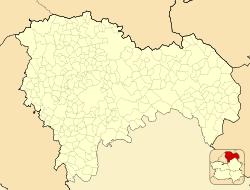This article needs additional citations for verification .(April 2024) |
Mazuecos, Spain | |
|---|---|
 | |
| Coordinates: 40°15′50″N3°00′33″W / 40.26389°N 3.00917°W | |
| Country | |
| Autonomous community | |
| Province | Guadalajara |
| Municipality | Mazuecos |
| Area | |
• Total | 23 km2 (8.9 sq mi) |
| Population (2024-01-01) [1] | |
• Total | 282 |
| • Density | 12/km2 (32/sq mi) |
| Time zone | UTC+1 (CET) |
| • Summer (DST) | UTC+2 (CEST) |
For people with the surname, see Mazuecos (surname).
Mazuecos is a municipality located in the province of Guadalajara, Castile-La Mancha, Spain. According to the 2004 census (INE), the municipality has a population of 359 inhabitants. It has a total area of 23 km2.



